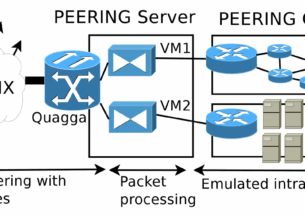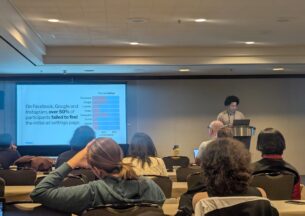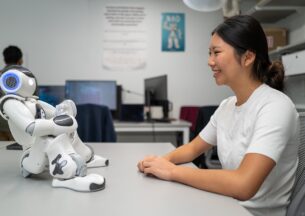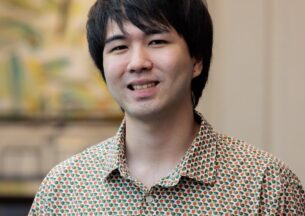Code with a Conscience: New CS Courses Tackle a Changing World
As technology continues to reshape our world, understanding its societal impact is more crucial than ever. For the upcoming fall quarter, the University of Chicago Department of Computer Science is proud to offer several new courses that delve into this connection. Each course provides a unique opportunity to apply your technical expertise to broader societal challenges. Explore the courses below to see how you can connect your work in computer science to the world around you.
CMSC 29520/39520 Sustainability and Computing
Taught by Andrew Chien
Tuesdays & Thursdays, 11:00 am-12:20 pm
Once a darling of the economy, the computing industry has come under fire as “techlash” brings a spotlight to its negative environmental and societal impacts. We focus on understanding computing’s environmental impact, and the productive and substantial (not greenwashing) actions that can be taken to reduce it. The objective of this course is to expose students to a sophisticated understanding of how computing impacts the environment and how it can become more sustainable through action in several dimensions, including technological innovation and design, business/ecosystem structure, and individual and government action. Students will be empowered with the intellectual tools to understand and act with insight on these issues in their professional careers. The course will feature guest lecturers, including John Birge (UChicago), Arman Shehabi (Lawrence Berkeley Laboratory), Pedro Lopes and Jasmine Lu (UChicago), and Sanjay Krishnan (UChicago). There will be three in-class exercises with topics including Jevons Paradox, power grid dynamics, technology improvement, and corporate pursuit of growth. This course is open to both graduates and undergraduates. Please note that for undergraduates, this course is considered a “Big Problems” course and is open to non-CS majors! For more information on the course, please visit the course website here.
CMSC 33281 Topics in Human-Robot Interaction
Taught by Sarah Sebo
Tuesdays & Thursdays, 11 am-12:20 pm
People engage with most machines (e.g., microwaves, cell phones, printers) in similar ways that they engage with non-machine tools (e.g., hammers, water bottles) – they enable people to complete tasks and extend what a person can do. However, robots, a specific kind of machine, seem to occupy a unique category where people treat them somewhere in between a tool and a human or social agent. A vast majority of people believe that robots cannot have emotions or consciousness and that the role of robots is to assist people, much like the purpose of a tool. However, unlike tools, people often ascribe agency, autonomy, and mind to a wide range of robots – from robot vacuums to humanoid robots. In this class, we will try to answer the questions: What factor(s) determine when people engage with robots and machines as tools versus social agents? What are the consequences or outcomes of engaging with robots as tools versus social agents? To answer these questions, students will discuss relevant research papers during class meetings, and students will write a final paper that proposes a new HRI theory that predicts how humans interact with robots and machines. There will be guest lectures by Dr. Greg Trafton and Dr. Nick Epley. This is a graduate level course that can be taken either as a CS elective (this course is considered an HCI elective) or as a seminar. For more information, please visit the course website here.
CMSC 35370 AI Agents for Science
Taught by Ian Foster
Mondays & Wednesdays, 3:00 pm-4:20 pm
This graduate-level course explores how intelligent agents powered by large-scale AI models can be applied to accelerate scientific discovery. Students will learn the foundations of agent design, orchestration, and evaluation, with an emphasis on connecting agents to real-world scientific resources (data repositories, simulations, and laboratory automation). The course will combine lectures, paper discussions, and hands-on assignments. Each student or group will undertake a course project, such as building and evaluating a small-scale agent for a scientific use case (e.g., literature synthesis, data curation, or workflow automation). To support these projects, students will gain access to AI models and compute/storage infrastructure via Argonne and UChicago resources. Students will be able to run agents, experiment with orchestration frameworks, and store/share datasets in a managed environment, and the course will culminate in a short presentation and written report. Foster emphasizes, “AI agents are poised to transform how we do science — from accelerating discovery to enabling entirely new kinds of research. This course gives students both the conceptual grounding and the practical experience to contribute to this exciting frontier. If you’re curious about how AI can become a true partner in science, this is the class to take. For more information on the course, please visit the course website here.
CMSC 35800 Advanced Adversarial Machine Learning
Taught by Ben Zhao and Heather Zheng
Tuesdays & Thursdays, 12:30 pm-1:50 pm
Machine learning tools are integrated into all facets of our lives, ranging from facial recognition running on deep neural network classifiers on our phones to large language models as productivity and educational tools. They are dynamic and ever-evolving tools with significant limitations and weaknesses, some of which can be used to weaponize to produce harm, while others can be used to limit those harms. This course takes a pragmatic perspective on the intersection between machine learning and security and privacy. The course will focus on advanced topics related to both security (robustness, consistency, attacks, and defenses) and privacy of machine learning models, ranging from deep neural network classifiers to generative models (LLMs and diffusion models). Lectures will cover high-impact research literature in the field, and students will conduct open-ended research in course projects. This course is offered to graduate students only, but the first undergraduate-only version of this course was taught in the past Spring as CMSC 25800. There was a final optional assignment (assigned as extra credit) where students were asked to test the robustness of LLMs, with a focus on PhoenixAI. Students from CMSC 25800 discovered working jailbreaks around it in just a few hours. For more information on this course, please contact professors Ben Zhao and Heather Zheng directly.














